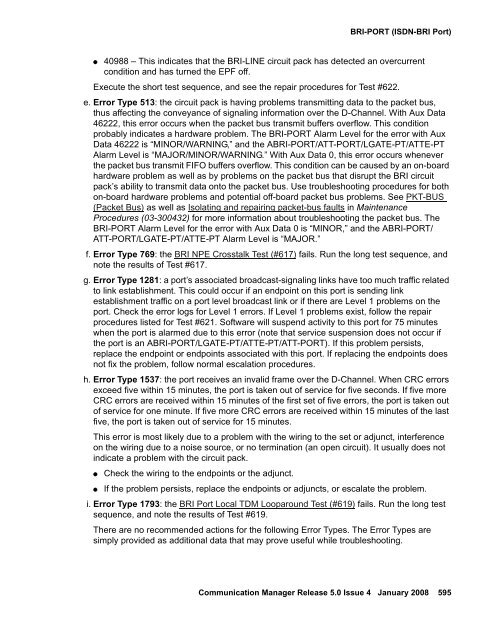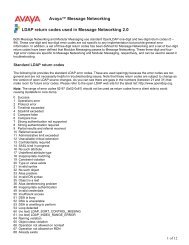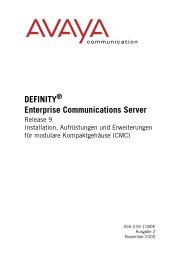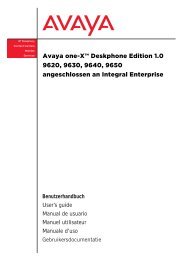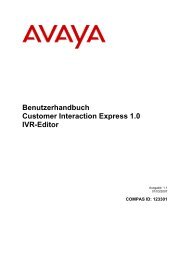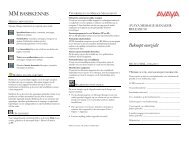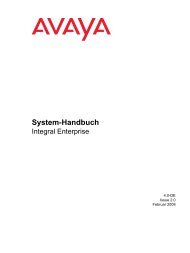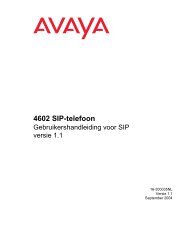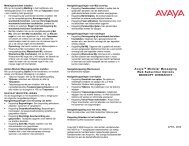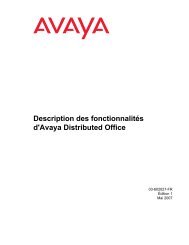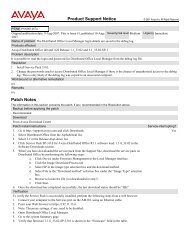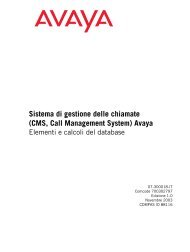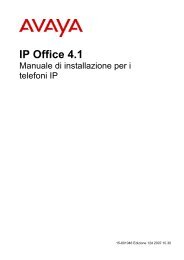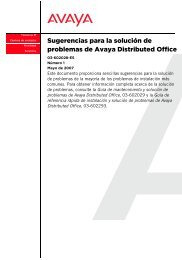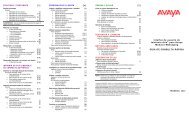- Page 1 and 2:
Maintenance Alarms for Avaya Commun
- Page 3 and 4:
Contents About this book . . . . .
- Page 5 and 6:
S8730 Server LEDs . . . . . . . . .
- Page 7 and 8:
CAB-MTCE (Media Gateway Maintenance
- Page 9 and 10:
MEDPRO (Media Processor MAPD Circui
- Page 11 and 12:
TBRI-PT (ISDN Trunk-Side BRI Port)
- Page 13 and 14:
External Device Alarm Query Test (#
- Page 15 and 16:
Maintenance/Test Circuit Pack Query
- Page 17 and 18:
VC DSP Port NPE Crosstalk Test (#11
- Page 19 and 20:
Power Supply Fan Test (#1538) . . .
- Page 21 and 22:
About this book Overview This docum
- Page 23 and 24:
How to use this Document How to use
- Page 25 and 26:
Conventions used in this document A
- Page 27 and 28:
Other conventions used in this book
- Page 29 and 30:
Table 3: Additional document resour
- Page 31 and 32:
Downloading this book and updates f
- Page 33 and 34:
Chapter 1: Server Alarms During nor
- Page 35 and 36:
Background Terms ● MINOR alarms i
- Page 37 and 38:
Alarms in Linux Servers Note: Note:
- Page 39 and 40:
● DAJ1/DAL1/DAL2 (Duplication Mem
- Page 41 and 42:
Table 5: ARB Alarms 1 of 10 Event I
- Page 43 and 44:
Table 5: ARB Alarms 3 of 10 Event I
- Page 45 and 46:
Table 5: ARB Alarms 5 of 10 Event I
- Page 47 and 48:
Table 5: ARB Alarms 7 of 10 Event I
- Page 49 and 50:
Table 5: ARB Alarms 9 of 10 Event I
- Page 51 and 52:
CMG (Common Media Gateway) See Medi
- Page 53 and 54:
Table 6: DAJ1/DAL1/DAL2 Alarms 2 of
- Page 55 and 56:
Table 7: testdupboard command synta
- Page 57 and 58:
Duplication Memory Board Local Loop
- Page 59 and 60:
Table 10: DUP Alarms 2 of 4 Event I
- Page 61 and 62:
Table 10: DUP Alarms 4 of 4 Event I
- Page 63 and 64:
Table 11: ENV Alarms 2 of 14 Event
- Page 65 and 66:
Table 11: ENV Alarms 4 of 14 Event
- Page 67 and 68:
Table 11: ENV Alarms 6 of 14 Event
- Page 69 and 70:
Table 11: ENV Alarms 8 of 14 Event
- Page 71 and 72:
Table 11: ENV Alarms 10 of 14 Event
- Page 73 and 74:
Table 11: ENV Alarms 12 of 14 Event
- Page 75 and 76:
Table 11: ENV Alarms 14 of 14 Event
- Page 77 and 78:
Table 12: ESS Alarms 2 of 2 Event I
- Page 79 and 80:
GAM (Global Alarm Manager) GAM (Glo
- Page 81 and 82:
Server Type Hard Disk Drive Alarm T
- Page 83 and 84:
Table 17: S8400 Hard Disk Drive Ala
- Page 85 and 86:
Table 18: S8730 Hard Disk Drive Ala
- Page 87 and 88:
Table 19: SMART Alarms 3 of 5 Event
- Page 89 and 90:
Table 19: SMART Alarms 5 of 5 Event
- Page 91 and 92:
Login Alarms Login Alarms The syste
- Page 93 and 94:
Table 22: S8300 Login Alarms 2 of 2
- Page 95 and 96:
NIC (Network Interface Card) NIC (N
- Page 97 and 98:
Table 26: RMB Alarms in the S8500 S
- Page 99 and 100:
Table 26: RMB Alarms in the S8500 S
- Page 101 and 102:
SME (Server Maintenance Engine) SME
- Page 103 and 104:
SVC_MON (Service Monitor) SVC_MON (
- Page 105 and 106:
Table 30: SVC_MON Alarms 3 of 8 Eve
- Page 107 and 108:
Table 30: SVC_MON Alarms 5 of 8 Eve
- Page 109 and 110:
Table 30: SVC_MON Alarms 7 of 8 Eve
- Page 111 and 112:
_TM (Translation Manager) _TM (Tran
- Page 113 and 114:
UPG (Upgrade) UPG (Upgrade) The UPG
- Page 115 and 116:
Table 34: Enterprise-Specific UPS T
- Page 117 and 118:
UPS Alarms to the Server UPS (Unint
- Page 119 and 120:
Table 35: UPS Alarms 3 of 3 Event I
- Page 121 and 122:
Table 37: testmodem command usage U
- Page 123 and 124:
Table 39: Off-Hook Test 2 of 2 Erro
- Page 125 and 126:
_WD (Watchdog) The Watchdog is a se
- Page 127 and 128:
Table 41: _WD Alarms 2 of 16 Event
- Page 129 and 130:
Table 41: _WD Alarms 4 of 16 Event
- Page 131 and 132:
Table 41: _WD Alarms 6 of 16 Event
- Page 133 and 134:
Table 41: _WD Alarms 8 of 16 Event
- Page 135 and 136:
Table 41: _WD Alarms 10 of 16 Event
- Page 137 and 138:
Table 41: _WD Alarms 12 of 16 Event
- Page 139 and 140:
Table 41: _WD Alarms 14 of 16 Event
- Page 141 and 142:
Table 41: _WD Alarms 16 of 16 Event
- Page 143 and 144:
3. Use the descriptions in Table 42
- Page 145 and 146:
Chapter 2: Denial Events The follow
- Page 147 and 148:
Table 44: Acronyms 3 of 4 Acronym M
- Page 149 and 150:
Event Type number ranges Event Type
- Page 151 and 152:
Cause Values and their meanings/int
- Page 153 and 154:
. Event Data See Table 56: ISDN, IP
- Page 155 and 156:
Table 50: Country Codes and Transmi
- Page 157 and 158:
Table 51: Cause Value Classes and R
- Page 159 and 160:
Troubleshooting Cause Value 03 Even
- Page 161 and 162:
Cause Value 05 Event Data - AAR/ARS
- Page 163 and 164:
Troubleshooting Wait and try the ca
- Page 165 and 166:
Cause Value 18 Event Data ● Check
- Page 167 and 168:
Cause Value 23 [0x17/0x97] - Redire
- Page 169 and 170:
Troubleshooting Cause Value 30 Even
- Page 171 and 172:
Troubleshooting Cause Value 35 Even
- Page 173 and 174:
This Cause Value is usually deliver
- Page 175 and 176:
Cause Value 50 Event Data [0x32/0xB
- Page 177 and 178:
Cause Value 56 Event Data [0x38/0xB
- Page 179 and 180:
Cause Value 59 Event Data [0x3B/0xB
- Page 181 and 182:
Service or Option not Implemented C
- Page 183 and 184:
Cause Value 70 Event Data [0x46/0xC
- Page 185 and 186:
Cause Value 83 Event Data ● Commu
- Page 187 and 188:
Cause Value 89 Event Data - A data
- Page 189 and 190:
Troubleshooting Event Data ● Chec
- Page 191 and 192:
This Cause Value has local signific
- Page 193 and 194:
Cause Value 99 Event Data Problems
- Page 195 and 196:
Cause Value 102 Event Data ● Call
- Page 197 and 198:
Event Data ● the far end never sa
- Page 199 and 200:
Event Data Cause Value 111 (NI-2) i
- Page 201 and 202:
Table 55: Call Process denial event
- Page 203 and 204:
Table 55: Call Process denial event
- Page 205 and 206:
Table 55: Call Process denial event
- Page 207 and 208:
Table 55: Call Process denial event
- Page 209 and 210:
Table 55: Call Process denial event
- Page 211 and 212:
Table 55: Call Process denial event
- Page 213 and 214:
Table 56: ISDN, IP, and SIP-generat
- Page 215 and 216:
Table 56: ISDN, IP, and SIP-generat
- Page 217 and 218:
Table 57: Call Process denial event
- Page 219 and 220:
Table 57: Call Process denial event
- Page 221 and 222:
Table 57: Call Process denial event
- Page 223 and 224:
Table 57: Call Process denial event
- Page 225 and 226:
Table 57: Call Process denial event
- Page 227 and 228:
Table 57: Call Process denial event
- Page 229 and 230:
Table 57: Call Process denial event
- Page 231 and 232:
Table 57: Call Process denial event
- Page 233 and 234:
Table 57: Call Process denial event
- Page 235 and 236:
Table 57: Call Process denial event
- Page 237 and 238:
Table 57: Call Process denial event
- Page 239 and 240:
Table 57: Call Process denial event
- Page 241 and 242:
Table 57: Call Process denial event
- Page 243 and 244:
Table 57: Call Process denial event
- Page 245 and 246:
Table 57: Call Process denial event
- Page 247 and 248:
Table 57: Call Process denial event
- Page 249 and 250:
Table 57: Call Process denial event
- Page 251 and 252:
Table 59: IP Denial Events (1907 -
- Page 253 and 254:
Table 59: IP Denial Events (1907 -
- Page 255 and 256:
Table 59: IP Denial Events (1907 -
- Page 257 and 258:
Table 59: IP Denial Events (1907 -
- Page 259 and 260:
Table 59: IP Denial Events (1907 -
- Page 261 and 262:
Table 60: Call Process denial event
- Page 263 and 264:
Table 60: Call Process denial event
- Page 265 and 266:
Table 60: Call Process denial event
- Page 267 and 268:
Table 60: Call Process denial event
- Page 269 and 270:
Table 60: Call Process denial event
- Page 271 and 272:
Table 60: Call Process denial event
- Page 273 and 274:
Table 60: Call Process denial event
- Page 275 and 276:
Table 60: Call Process denial event
- Page 277 and 278:
Table 60: Call Process denial event
- Page 279 and 280:
Connection Manager Denial Events De
- Page 281 and 282:
Table 61: Connection Manager denial
- Page 283 and 284:
Dial Plan Manager Denial Events Den
- Page 285 and 286:
Table 65: Meet Me Conference denial
- Page 287 and 288:
Table 67: Data Error denial events
- Page 289 and 290:
ESS Denial Events ESS-generated den
- Page 291 and 292:
Chapter 3: LEDs LEDs are important
- Page 293 and 294:
Circuit Pack LEDs After a circuit p
- Page 295 and 296:
Circuit Pack LEDs The second group
- Page 297 and 298:
Figure 2: TN767/TN464 LEDs Circuit
- Page 299 and 300:
Table 75: TN767/TN464 circuit pack
- Page 301 and 302:
Circuit Pack LEDs The yellow LED in
- Page 303 and 304:
Circuit Pack LEDs The yellow LED in
- Page 305 and 306:
Circuit Pack LEDs Table 78: Switch
- Page 307 and 308:
Avaya Ethernet Switch LEDs Avaya Et
- Page 309 and 310:
IPSI LEDs IPSI LEDs There are four
- Page 311 and 312:
Figure 8: IPSI Board Display using
- Page 313 and 314:
Figure 10: TN2501AP faceplate LEDs
- Page 315 and 316:
Table 81: TN2501AP LEDs 2 of 2 LED
- Page 317 and 318:
Duplication Memory Board LEDs LED i
- Page 319 and 320:
Duplication Memory Board LEDs ● L
- Page 321 and 322:
Figure 14: S8300/S8300B Server S830
- Page 323 and 324:
S8300 LED lighting sequence S8300/S
- Page 325 and 326:
S8500 Server LEDs S8500 Server LEDs
- Page 327 and 328:
Figure 17: S8500C Server (front) Fi
- Page 329 and 330:
S8700 Server LEDs During the test,
- Page 331 and 332:
Figure 20: LEDs on front panel of t
- Page 333 and 334:
Figure 21: LEDs on back panel of S8
- Page 335 and 336:
1. DVD/CD-ROM Drive 2. Video connec
- Page 337 and 338:
Figure 24: S8730 Systems Insight Di
- Page 339 and 340:
Figure 25: S8730 Server Rear Panel
- Page 341 and 342:
Table 90: Hard Drive LED Combinatio
- Page 343 and 344:
MM710 E1/T1 Media Module LEDs The M
- Page 345 and 346:
MM314 LAN Media Module LEDs MM314 A
- Page 347 and 348:
MM340 E1/T1 Data WAN Media Module L
- Page 349 and 350:
G250-Analog Figure 27: G250-Analog
- Page 351 and 352:
Analog Port LEDs The analog ports a
- Page 353 and 354:
DCP Port LEDs These LEDS represent
- Page 355 and 356:
G350 LEDs Follow the links in the F
- Page 357 and 358:
See Table 3.1: Avaya P333T LED Desc
- Page 359 and 360:
G700 Front panel LEDs G700 LEDs The
- Page 361 and 362:
Red ALM or Alarm LED G700 LEDs The
- Page 363 and 364:
Table 94: LED Definitions 2 of 2 No
- Page 365 and 366:
Chapter 4: Media Gateway Traps This
- Page 367 and 368:
Add INADS Phone Numbers and Enable
- Page 369 and 370:
G250/G350 Traps This command is use
- Page 371 and 372:
Table 97: G250/G350 pre-configured
- Page 373 and 374:
Table 98: G250/G350 Traps and Resol
- Page 375 and 376:
Table 98: G250/G350 Traps and Resol
- Page 377 and 378:
Table 98: G250/G350 Traps and Resol
- Page 379 and 380:
Table 98: G250/G350 Traps and Resol
- Page 381 and 382:
Table 98: G250/G350 Traps and Resol
- Page 383 and 384:
Table 98: G250/G350 Traps and Resol
- Page 385 and 386:
Table 98: G250/G350 Traps and Resol
- Page 387 and 388:
G700 Traps Configure the G700 to se
- Page 389 and 390:
G700 Traps resolution procedures in
- Page 391 and 392:
Table 99: Media Gateway Traps and R
- Page 393 and 394:
Table 99: Media Gateway Traps and R
- Page 395 and 396:
Table 99: Media Gateway Traps and R
- Page 397 and 398:
Table 99: Media Gateway Traps and R
- Page 399 and 400:
Table 99: Media Gateway Traps and R
- Page 401 and 402:
Table 99: Media Gateway Traps and R
- Page 403 and 404:
Table 99: Media Gateway Traps and R
- Page 405 and 406:
Table 99: Media Gateway Traps and R
- Page 407 and 408:
Table 99: Media Gateway Traps and R
- Page 409 and 410:
Table 99: Media Gateway Traps and R
- Page 411 and 412:
Chapter 5: Communication Manager Ma
- Page 413 and 414:
G700 Subsystems Displaying MOs Main
- Page 415 and 416:
Table 101: Media Module Types 2 of
- Page 417 and 418:
Abort Code 1412 ● Off-Board probl
- Page 419 and 420:
4. G650 MGs have power supply in sl
- Page 421 and 422:
AC-POWER AC Power for AC-Powered Sy
- Page 423 and 424:
Note: The Note: following tests app
- Page 425 and 426:
Demand test descriptions and error
- Page 427 and 428:
ADJ-IP (ASAI Adjunct TCP/IP Link) c
- Page 429 and 430:
Table 107: Administered Connection
- Page 431 and 432:
ADX8D-BD (AUDIX Circuit Pack) ADX8D
- Page 433 and 434:
Table 108: ADX8D-PT Error Log Entri
- Page 435 and 436:
ADX8D-RS (AUDIX Reserve Slots) See
- Page 437 and 438:
ADX16A-P (AUDIX Analog Line/Control
- Page 439 and 440:
ADX16A-P (AUDIX Analog Line/Control
- Page 441 and 442:
ADX16D-P (16-Port AUDIX Digital Por
- Page 443 and 444:
ADX16D-P (16-Port AUDIX Digital Por
- Page 445 and 446:
AESV-LNK (AE Services Link) MO Name
- Page 447 and 448:
Aux Data Description AESV-LNK (AE S
- Page 449 and 450:
AESV-SES (AE Services Session) Link
- Page 451 and 452:
Demand test descriptions and error
- Page 453 and 454:
Table 114: AN-LN-PT Error log entri
- Page 455 and 456:
Demand test descriptions and error
- Page 457 and 458:
Ringing Caused by Maintenance Testi
- Page 459 and 460:
Demand test descriptions and error
- Page 461 and 462:
ANL-LINE (8-Port Analog Line) MO Na
- Page 463 and 464:
ANL-LINE (8-Port Analog Line) a low
- Page 465 and 466:
ANN-BD (Announcement circuit pack)
- Page 467 and 468:
ANN-BD (Announcement circuit pack)
- Page 469 and 470:
ANN-BD (Announcement circuit pack)
- Page 471 and 472:
WARNING: Reseating ANN-BD (Announce
- Page 473 and 474:
Order of investigation Short Test S
- Page 475 and 476:
Error log entries and recommended a
- Page 477 and 478:
ANNOUNCE (Announcement) ANNOUNCE (A
- Page 479 and 480:
Table 120: Aux data error codes and
- Page 481 and 482:
ASAI-BD (Multi-Application Platform
- Page 483 and 484:
Table 121: ASAI-EPT Error Log Entri
- Page 485 and 486:
ASAI-EPT (ASAI Endpoint) g. Error T
- Page 487 and 488:
Table 122: ASAI cause values 2 of 2
- Page 489 and 490:
ASAI-PT (ASAI Port) ASAI-PT (ASAI P
- Page 491 and 492:
ASAI-PT (ASAI Port) d. Error Type 1
- Page 493 and 494:
ATM-BCH (ATM B-Channel Trunk) ATM-B
- Page 495 and 496:
B-Channel Alarms ATM-BCH (ATM B-Cha
- Page 497 and 498:
ATM-BCH (ATM B-Channel Trunk) ● O
- Page 499 and 500:
Demand test descriptions and error
- Page 501 and 502:
Error log entries and recommended a
- Page 503 and 504:
LEDs The ATM Interface circuit pack
- Page 505 and 506:
Critical Reliability ATM-EI (Expans
- Page 507 and 508:
B-side ATM-EI—Critical Reliabilit
- Page 509 and 510:
Table 130: ATM-EI Error Log Entries
- Page 511 and 512:
● Some other ATM-EI board is not
- Page 513 and 514:
Table 131: ATM Error Types 1024 - 1
- Page 515 and 516:
Table 133: Error type 1281 Aux Data
- Page 517 and 518:
Table 133: Error type 1281 Aux Data
- Page 519 and 520:
CAUTION: If CAUTION: If ATM-EI (Exp
- Page 521 and 522:
ATM-EI (Expansion Interface Circuit
- Page 523 and 524:
ATM-INTF (ATM Interface) Notes: a.
- Page 525 and 526:
If ATM-NTWK receives more than 6 er
- Page 527 and 528:
Table 136: Error codes and Aux Data
- Page 529 and 530:
Table 136: Error codes and Aux Data
- Page 531 and 532:
ATM-NTWK (ATM Network Error) Notes:
- Page 533 and 534:
ATM-NTWK (ATM Network Error) Possib
- Page 535 and 536:
ATM PNC-DUP (ATM PNC Duplication) S
- Page 537 and 538:
Enabling and Removing PNC Duplicati
- Page 539 and 540:
PNC State-of-Health Indexes ATM PNC
- Page 541 and 542:
PNC Interchanges ATM PNC-DUP (ATM P
- Page 543 and 544: ● The global refresh from releasi
- Page 545 and 546: Table 141: Error Log Encode Field D
- Page 547 and 548: Error log entries and recommended a
- Page 549 and 550: ATM-SGRP (ATM Signaling Group) g. E
- Page 551 and 552: 3890 A request to use a network ser
- Page 553 and 554: 3928 A call was denied because of a
- Page 555 and 556: Stratum 4 Synchronization ATM-SYNC
- Page 557 and 558: ATM-SYNC Commands ATM-SYNC (ATM Syn
- Page 559 and 560: ATM-SYNC (ATM Synchronization) 2. T
- Page 561 and 562: LEDs Virtual D-Channels ATM-TRK (Ci
- Page 563 and 564: Table 150: ATM-TRK Error Log entrie
- Page 565 and 566: ATM-TRK (Circuit Emulation Service
- Page 567 and 568: Table 151: Error type 1281 Aux Data
- Page 569 and 570: ATM-TRK (Circuit Emulation Service
- Page 571 and 572: If Then There are no packet bus ala
- Page 573 and 574: Order of Investigation Short Test S
- Page 575 and 576: ATTE-AJ (Ethernet Avaya Adjunct) Se
- Page 577 and 578: AUX-TRK (Auxiliary Trunk) AUX-TRK (
- Page 579 and 580: Table 152: AUX-TRK Error Log Entrie
- Page 581 and 582: AXA12-BD (AUDIX Circuit Pack) MO Na
- Page 583 and 584: AXD12-BD (AUDIX circuit pack) MO Na
- Page 585 and 586: BRI-BD (ISDN-BRI Line Circuit Pack)
- Page 587 and 588: BRI-BD (ISDN-BRI Line Circuit Pack)
- Page 589 and 590: BRI-BD (ISDN-BRI Line Circuit Pack)
- Page 591 and 592: BRI-PORT (ISDN-BRI Port) MO Name in
- Page 593: Figure 39: ISDN-BRI Port Interactio
- Page 597 and 598: Order of Investigation Short Test S
- Page 599 and 600: BRI-SET, Various Adjuncts context,
- Page 601 and 602: Table 155: BRI-SET/Adjunct Error Lo
- Page 603 and 604: BRI-SET, Various Adjuncts e. Error
- Page 605 and 606: BRI-SET, Various Adjuncts Table 156
- Page 607 and 608: BRI-SET, Various Adjuncts Table 157
- Page 609 and 610: Table 158: SPID Facility Test Test
- Page 611 and 612: CAB-CALM (Customer alarm) G650 MO N
- Page 613 and 614: Error log entries and recommended a
- Page 615 and 616: Table 161: CAB-MTCE Error Log Entri
- Page 617 and 618: Demand test descriptions and error
- Page 619 and 620: Table 163: CAB-TEMP Error Log Entri
- Page 621 and 622: Variable-Speed Fans A variable-spee
- Page 623 and 624: Note: An CABINET (Cabinet Sensors)
- Page 625 and 626: CMC1 Order of Investigation Short T
- Page 627 and 628: Cycling Power Supplies CARR-POW (Ca
- Page 629 and 630: Figure 42: Battery Charger (Optiona
- Page 631 and 632: J58890CH-1 CARR-POW (Carrier Power
- Page 633 and 634: Figure 46: Small Battery Assembly F
- Page 635 and 636: Figure 48: Typical Multicarrier Cab
- Page 637 and 638: Demand test descriptions and error
- Page 639 and 640: CLAN-BD (Control LAN Circuit Pack)
- Page 641 and 642: Error log entries and recommended a
- Page 643 and 644: CLAN-BD (Control LAN Circuit Pack)
- Page 645 and 646:
CLAN-BD (Control LAN Circuit Pack)
- Page 647 and 648:
CLAN-BD (Control LAN Circuit Pack)
- Page 649 and 650:
CLSFY-PT (Call Classifier Port) CLS
- Page 651 and 652:
CO-BD (Central Office Trunk Circuit
- Page 653 and 654:
CO-DS1 (DS1 CO Trunk) The DS1 Inter
- Page 655 and 656:
CO-DS1 (DS1 CO Trunk) i. Error Type
- Page 657 and 658:
Interactions between switch and CO
- Page 659 and 660:
Error log entries and recommended a
- Page 661 and 662:
CO-TRK (Analog CO Trunk) Call Seizu
- Page 663 and 664:
Demand test descriptions and error
- Page 665 and 666:
CONFIG (System Configuration) Type
- Page 667 and 668:
CONFIG (System Configuration) Table
- Page 669 and 670:
CONFIG (System Configuration) Table
- Page 671 and 672:
DAT-LINE (Data Line Port) DAT-LINE
- Page 673 and 674:
Demand test descriptions and error
- Page 675 and 676:
DC-POWER (Single-Carrier Cabinet En
- Page 677 and 678:
DID-BD (Direct Inward Dial Trunk Ci
- Page 679 and 680:
Error log entries and recommended a
- Page 681 and 682:
Demand test descriptions and error
- Page 683 and 684:
DID Trunk Testing DID-TRK (Direct I
- Page 685 and 686:
DID-TRK (Direct Inward Dial Trunk)
- Page 687 and 688:
DIG-BD (Digital Line Circuit Pack)
- Page 689 and 690:
Table 179: DIG-IP-S Error Log Entri
- Page 691 and 692:
DIG-LINE (Digital Line) DIG-LINE (D
- Page 693 and 694:
DIG-LINE (Digital Line) Only 2-wire
- Page 695 and 696:
Programmable Terminals The followin
- Page 697 and 698:
Audits DIG-LINE (Digital Line) As p
- Page 699 and 700:
Table 182: DIG-LINE Error Log Entri
- Page 701 and 702:
DIG-LINE (Digital Line) k. Error Ty
- Page 703 and 704:
DIG-RES (TN800 reserve slot) See AS
- Page 705 and 706:
DIOD-DS1 (DS1 DIOD Trunk) DIOD-DS1
- Page 707 and 708:
Table 183: DIOD-DS1 Error Log Entri
- Page 709 and 710:
Demand test descriptions and error
- Page 711 and 712:
Incoming Call 1. CO Applies Ringing
- Page 713 and 714:
DIOD-TRK (DIOD Trunk) e. Error Type
- Page 715 and 716:
Daily Maintenance Interference DLY-
- Page 717 and 718:
DS1-BD (DS1 Interface Circuit Pack)
- Page 719 and 720:
Figure 52: High-Level Overview Of L
- Page 721 and 722:
Table 187: DS1-BD Error Log Entries
- Page 723 and 724:
DS1-BD (DS1 Interface Circuit Pack)
- Page 725 and 726:
DS1-BD (DS1 Interface Circuit Pack)
- Page 727 and 728:
Order of Investigation Short Test S
- Page 729 and 730:
DS1-FAC (DS1 Facility) The DS1 conv
- Page 731 and 732:
DS1-FAC (DS1 Facility) For a critic
- Page 733 and 734:
Table 188: DS1 Interface Options ad
- Page 735 and 736:
Table 189: DS1 Facility Line Signal
- Page 737 and 738:
DS1-FAC (DS1 Facility) Notes: When
- Page 739 and 740:
DS1-FAC (DS1 Facility) external-loo
- Page 741 and 742:
DS1-FAC (DS1 Facility) facility is
- Page 743 and 744:
Figure 54: DS1 Facility Connections
- Page 745 and 746:
DS1C-BD (DS1 Converter Circuit Pack
- Page 747 and 748:
Figure 57: DS1 converter Complex in
- Page 749 and 750:
DS1C-BD (DS1 Converter Circuit Pack
- Page 751 and 752:
Clear Firmware-Counters Command DS1
- Page 753 and 754:
Replacing a DS1 Converter Circuit P
- Page 755 and 756:
Upgrading TN574 DS1 Converter Circu
- Page 757 and 758:
DS1C-BD (DS1 Converter Circuit Pack
- Page 759 and 760:
Table 192: Convert from DS1-CONV to
- Page 761 and 762:
Table 193: Removing Fiber Connectiv
- Page 763 and 764:
Error log entries and recommended a
- Page 765 and 766:
DS1C-BD (DS1 Converter Circuit Pack
- Page 767 and 768:
DS1C-BD (DS1 Converter Circuit Pack
- Page 769 and 770:
Demand test descriptions and error
- Page 771 and 772:
DTMR-PT (Dual-Tone Multifrequency R
- Page 773 and 774:
Demand test descriptions and error
- Page 775 and 776:
E-DIG-ST (Emulated Digital Line) E-
- Page 777 and 778:
Demand test descriptions and error
- Page 779 and 780:
Table 198: EMG-XFER Error Log Entri
- Page 781 and 782:
EPN-SNTY (PN Sanity Audit) EPN-SNTY
- Page 783 and 784:
ERR-LOG (Error Log) ERR-LOG (Error
- Page 785 and 786:
Table 200: ESS Error Log Entries 2
- Page 787 and 788:
CAUTION: In ESS (Enterprise Surviva
- Page 789 and 790:
ESS (Enterprise Survivable Server)
- Page 791 and 792:
ETH-PT (Control LAN Ethernet) ETH-P
- Page 793 and 794:
. d. Error Type 769: Port received
- Page 795 and 796:
ETR-PT (Enhanced Tone Receiver Port
- Page 797 and 798:
ETR-PT (Enhanced Tone Receiver Port
- Page 799 and 800:
EXP-INTF (Expansion Interface Circu
- Page 801 and 802:
EXP-INTF (Expansion Interface Circu
- Page 803 and 804:
Figure 63: Center Stage Switch Conf
- Page 805 and 806:
Survivable Remote EPN EXP-INTF (Exp
- Page 807 and 808:
EXP-INTF (Expansion Interface Circu
- Page 809 and 810:
EXP-INTF (Expansion Interface Circu
- Page 811 and 812:
CAUTION: Before EXP-INTF (Expansion
- Page 813 and 814:
Replacing an EI Circuit Pack—Undu
- Page 815 and 816:
Note: The Note: Make EXP-INTF (Expa
- Page 817 and 818:
Table 205: EXP-INTF Error Log Entri
- Page 819 and 820:
EXP-INTF (Expansion Interface Circu
- Page 821 and 822:
EXP-INTF (Expansion Interface Circu
- Page 823 and 824:
EXP-PN (Expansion Port Network) S87
- Page 825 and 826:
Error log entries and recommended a
- Page 827 and 828:
EXT-DEV (External Device Alarm) G65
- Page 829 and 830:
EXT-DEV ADMIN? N (External Device A
- Page 831 and 832:
EXT-DEV ADMIN? Y (External Device A
- Page 833 and 834:
FIBER-LK (Fiber Link) MO Name in Lo
- Page 835 and 836:
Table 212: Expansion Interface Circ
- Page 837 and 838:
FIBER-LK (Fiber Link) c. Error Type
- Page 839 and 840:
Table 218: Tests Run for an SNI-to-
- Page 841 and 842:
Table 219: FW-DWNLD Error Log Entri
- Page 843 and 844:
Table 221: Aux Data for Error Type
- Page 845 and 846:
Table 221: Aux Data for Error Type
- Page 847 and 848:
FW-DWNLD (Firmware Download) c. Err
- Page 849 and 850:
Table 223: Error Type 513 Aux Data
- Page 851 and 852:
Downloading firmware to DCP station
- Page 853 and 854:
Schedule the download FW-STDL (Firm
- Page 855 and 856:
Table 224: FW-STDL Error Log entrie
- Page 857 and 858:
Table 226: Error Type 513 Aux Data
- Page 859 and 860:
Table 228: Reason Codes for status
- Page 861 and 862:
GPTD-PT (General-Purpose Tone Detec
- Page 863 and 864:
System Commands The following comma
- Page 865 and 866:
Table 231: H323-SGR Error Log Entri
- Page 867 and 868:
H323-SGR (H.323 Signaling Group) Ta
- Page 869 and 870:
H323-SGR (H.323 Signaling Group) Ta
- Page 871 and 872:
H323-STN (H.323 IP Station) H323-ST
- Page 873 and 874:
HYB-BD (Hybrid Line Circuit Pack) S
- Page 875 and 876:
Table 234: HYB-LINE Error Log Entri
- Page 877 and 878:
Order of Investigation Short Test S
- Page 879 and 880:
INADS (INADS Link) ● If the initi
- Page 881 and 882:
Table 235: INADS Link Test Error Lo
- Page 883 and 884:
IPMEDPRO (TN2302 IP Media Processor
- Page 885 and 886:
Table 236: TN2302 IPMEDPRO Error Lo
- Page 887 and 888:
IPMEDPRO (TN2302 IP Media Processor
- Page 889 and 890:
IPMEDPRO (TN2602AP IP Media Resourc
- Page 891 and 892:
Table 237: TN2602AP IPMEDPRO Error
- Page 893 and 894:
IPMEDPRO (TN2602AP IP Media Resourc
- Page 895 and 896:
IPMEDPRO (TN2602AP IP Media Resourc
- Page 897 and 898:
IPSV-CTL (IP Server Interface Contr
- Page 899 and 900:
Table 239: IPSI A is Active Functio
- Page 901 and 902:
IPSV-CTL (IP Server Interface Contr
- Page 903 and 904:
Error Log Entries IPSV-CTL (IP Serv
- Page 905 and 906:
IPSI Interchange (Duplicated IPSIs)
- Page 907 and 908:
IP-SVR (IP Server Interface) S8700
- Page 909 and 910:
TN2312AP IP Server Interface (IPSI)
- Page 911 and 912:
IP-SVR (IP Server Interface) The TN
- Page 913 and 914:
IPSI Circuit Pack Faceplate IP-SVR
- Page 915 and 916:
4-Character LED IP-SVR (IP Server I
- Page 917 and 918:
ISDN-PLK (ISDN-PRI Signaling Link P
- Page 919 and 920:
Demand test descriptions and error
- Page 921 and 922:
ISDN-SGR (ISDN-PRI Signaling Group)
- Page 923 and 924:
ISDN-SGR (ISDN-PRI Signaling Group)
- Page 925 and 926:
3878 The far-end switch has indicat
- Page 927 and 928:
ISDN-SGR (ISDN-PRI Signaling Group)
- Page 929 and 930:
ISDN-TRK (DS1 ISDN Trunk) On 24-cha
- Page 931 and 932:
ISDN-TRK (DS1 ISDN Trunk) ● Maint
- Page 933 and 934:
ISDN-PRI Trunk Service States ISDN-
- Page 935 and 936:
Table 255: ISDN-TRK Error Log Entri
- Page 937 and 938:
The meanings of Aux Data values are
- Page 939 and 940:
JNL-PRNT (Journal Printer Link) MO
- Page 941 and 942:
LGATE-BD (ISDN-BRI Line Circuit Pac
- Page 943 and 944:
LIC-ERR (License Error Mode) LIC-ER
- Page 945 and 946:
Error Type Aux Data Associated Test
- Page 947 and 948:
Troubleshooting License File errors
- Page 949 and 950:
Initialization and Periodic Checkin
- Page 951 and 952:
LOG-SVN (Login Security Violation)
- Page 953 and 954:
MAINT (PN Maintenance Circuit Pack)
- Page 955 and 956:
TN775D Maintenance Circuit Pack Use
- Page 957 and 958:
Demand test descriptions and error
- Page 959 and 960:
MAPD-BD (MAPD Interface Circuit Pac
- Page 961 and 962:
Figure 72: TN802 faceplate Figure n
- Page 963 and 964:
MAPD-BD (MAPD Interface Circuit Pac
- Page 965 and 966:
MAPD-BD (MAPD Interface Circuit Pac
- Page 967 and 968:
Figure 75: TN802 board assembly and
- Page 969 and 970:
Table 267: MAPD-BD Error Log entrie
- Page 971 and 972:
MAPD-BD (MAPD Interface Circuit Pac
- Page 973 and 974:
MAPD-BD (MAPD Interface Circuit Pac
- Page 975 and 976:
Figure 77: TN802 faceplate Figure n
- Page 977 and 978:
Demand test descriptions and error
- Page 979 and 980:
Error log entries and recommended a
- Page 981 and 982:
MEDPRO (Media Processor MAPD Circui
- Page 983 and 984:
Table 271: MEDPRO-C Error Log Entri
- Page 985 and 986:
MEDPRO-C (Media Processor Control)
- Page 987 and 988:
Error log entries and recommended a
- Page 989 and 990:
MED-GTWY (MEDIA GATEWAY) MED-GTWY (
- Page 991 and 992:
MET-BD (MET Line Circuit Pack) MET-
- Page 993 and 994:
Table 275: MET-LINE Error Log Entri
- Page 995 and 996:
Order of Investigation Short Test S
- Page 997 and 998:
Table 276: MG-ANA Error Log Entries
- Page 999 and 1000:
MG-ANN (Voice Announcements) MG-ANN
- Page 1001 and 1002:
Table 278: MG-BRI Error Log Entries
- Page 1003 and 1004:
MG-DCP (Digital Line Media Module)
- Page 1005 and 1006:
MG-DCP (Digital Line Media Module)
- Page 1007 and 1008:
Table 280: MG-DS1 Error Log Entries
- Page 1009 and 1010:
● Be administered using the add d
- Page 1011 and 1012:
● The tests run on the ports of t
- Page 1013 and 1014:
MG-IAMM (Integrated Analog Media Mo
- Page 1015 and 1016:
MG-IAMM (Integrated Analog Media Mo
- Page 1017 and 1018:
MG-IBRI (Integrated BRI Trunk Media
- Page 1019 and 1020:
MIS (Management Information System)
- Page 1021 and 1022:
Figure 78: TN787 Multimedia Interfa
- Page 1023 and 1024:
Table 284: MMI-BD Error Log Entries
- Page 1025 and 1026:
MMI-LEV (Multimedia Interface Resou
- Page 1027 and 1028:
MMI-PT (Multimedia Interface Port)
- Page 1029 and 1030:
Table 286: MMI-PT Error Log Entries
- Page 1031 and 1032:
MMI-SYNC (MMI Synchronization) MO N
- Page 1033 and 1034:
MODEM-BD (Modem Pool Circuit Pack)
- Page 1035 and 1036:
MODEM-PT (Modem Pool Port) Figure 8
- Page 1037 and 1038:
Troubleshooting Modem-Pool Symptoms
- Page 1039 and 1040:
Demand test descriptions and error
- Page 1041 and 1042:
Error log entries and recommended a
- Page 1043 and 1044:
M/T-BD (Maintenance/Test Circuit Pa
- Page 1045 and 1046:
M/T-BD (Maintenance/Test Circuit Pa
- Page 1047 and 1048:
M/T-DIG (Maintenance/Test Digital P
- Page 1049 and 1050:
Table 291: M/T-DIG Error Log Entrie
- Page 1051 and 1052:
M/T-PKT (Maintenance/Test Packet Bu
- Page 1053 and 1054:
M/T-PKT (Maintenance/Test Packet Bu
- Page 1055 and 1056:
Figure 85: License mode algorithm F
- Page 1057 and 1058:
NO-LIC (No License) g. Error Type 2
- Page 1059 and 1060:
Error log entries and recommended a
- Page 1061 and 1062:
Error log entries and recommended a
- Page 1063 and 1064:
Error log entries and recommended a
- Page 1065 and 1066:
PDMODULE (Processor Data Module) PD
- Page 1067 and 1068:
Configurations and Maintenance PDMO
- Page 1069 and 1070:
Error log entries and recommended a
- Page 1071 and 1072:
PDMODULE (Processor Data Module) k.
- Page 1073 and 1074:
● Use standard ISDN-PRI signaling
- Page 1075 and 1076:
PE-BCHL (PRI Endpoint Port) ports i
- Page 1077 and 1078:
Figure 89: Common Progressions in P
- Page 1079 and 1080:
PE-BCHL (PRI Endpoint Port) e. Erro
- Page 1081 and 1082:
PKT-BUS (Packet Bus) MO Name in Log
- Page 1083 and 1084:
Table 302: PKT-BUS Error Log Entrie
- Page 1085 and 1086:
Demand test descriptions and error
- Page 1087 and 1088:
PKT-INT (Packet Interface) The link
- Page 1089 and 1090:
Executing a PKT-INT Interchange The
- Page 1091 and 1092:
Figure 91: IP-PNC Duplex Reliabilit
- Page 1093 and 1094:
Figure 92: Duplex-Reliability Confi
- Page 1095 and 1096:
Critical-Reliability Configuration
- Page 1097 and 1098:
S8700 | S8710 | S8720 PKT-INT (Pack
- Page 1099 and 1100:
PKT-INT (Packet Interface) For a ca
- Page 1101 and 1102:
PKT-INT (Packet Interface) an out-o
- Page 1103 and 1104:
PKT-INT (Packet Interface) m. Error
- Page 1105 and 1106:
PLAT-ALM (Platform Alarms) PLAT-ALM
- Page 1107 and 1108:
Procedures for Restoring the PMS Li
- Page 1109 and 1110:
PMS-LINK (Property Management Syste
- Page 1111 and 1112:
Demand test descriptions and error
- Page 1113 and 1114:
PMS-PRNT (PMS Printer Link) PMS Pri
- Page 1115 and 1116:
PMS-PRNT (PMS Printer Link) e. Erro
- Page 1117 and 1118:
PNC-DUP Related Commands PNC-DUP (P
- Page 1119 and 1120:
Figure 97: Duplicated PNC with Cent
- Page 1121 and 1122:
PNC-DUP (PNC Duplication) 4. Remove
- Page 1123 and 1124:
PNC-DUP (PNC Duplication) The Inter
- Page 1125 and 1126:
PNC Interchanges PNC-DUP (PNC Dupli
- Page 1127 and 1128:
PNC-DUP (PNC Duplication) 3. At thi
- Page 1129 and 1130:
Error Type PNC-DUP (PNC Duplication
- Page 1131 and 1132:
PNC-DUP (PNC Duplication) m. Error
- Page 1133 and 1134:
PNC-DUP (PNC Duplication) aa. Error
- Page 1135 and 1136:
POWER anything go wrong with the ba
- Page 1137 and 1138:
Error log entries and recommended a
- Page 1139 and 1140:
POW-SUP (Power Supply) G650 MO name
- Page 1141 and 1142:
Error log entries and recommended a
- Page 1143 and 1144:
i. Error Type 1793: operational fai
- Page 1145 and 1146:
Table 310: PPP-PT Error Log Entries
- Page 1147 and 1148:
PPP-PT (Control LAN Packet/Port) j.
- Page 1149 and 1150:
PRI-CDR (Call Detail Recording Link
- Page 1151 and 1152:
PRI-CDR (Call Detail Recording Link
- Page 1153 and 1154:
PS-RGEN (Power Supply Ring Generato
- Page 1155 and 1156:
Demand test descriptions and error
- Page 1157 and 1158:
Table 314: RANL-STA Error Log Entri
- Page 1159 and 1160:
RC-BD (Radio Controller Board) MO N
- Page 1161 and 1162:
RC-BD (Radio Controller Board) 1. R
- Page 1163 and 1164:
RDIG-STA (Remote Digital Station) M
- Page 1165 and 1166:
Nonvolatile Memory RDIG-STA (Remote
- Page 1167 and 1168:
Demand Download Actions RDIG-STA (R
- Page 1169 and 1170:
RDIG-STA (Remote Digital Station) N
- Page 1171 and 1172:
REM-OFF (Remote Office) REM-OFF (Re
- Page 1173 and 1174:
Demand test descriptions and error
- Page 1175 and 1176:
Figure 99: Fan Removal Error log en
- Page 1177 and 1178:
RSCL-PT (Remote Socket Control Link
- Page 1179 and 1180:
S-SYN-PT (Speech Synthesis Port) S-
- Page 1181 and 1182:
Demand test descriptions and error
- Page 1183 and 1184:
SER-BUS (Serial Communication Bus)
- Page 1185 and 1186:
Figure 101: G650 Cabinet Environmen
- Page 1187 and 1188:
SER-BUS (Serial Communication Bus)
- Page 1189 and 1190:
SIP-BCH (SIP B-Channel) SIP-BCH (SI
- Page 1191 and 1192:
Table 324: SIP-SGRP Error Log Entri
- Page 1193 and 1194:
SIP-SGRP (SIP Signaling Group) o. E
- Page 1195 and 1196:
SIP-SGRP (SIP Signaling Group) Tabl
- Page 1197 and 1198:
SIP-SGRP (SIP Signaling Group) Tabl
- Page 1199 and 1200:
SIP-SGRP (SIP Signaling Group) Tabl
- Page 1201 and 1202:
SIP-SGRP (SIP Signaling Group) Tabl
- Page 1203 and 1204:
SN-CONF (Switch Node Configuration)
- Page 1205 and 1206:
SN-CONF (Switch Node Configuration)
- Page 1207 and 1208:
SNC-BD (Switch Node Clock Circuit P
- Page 1209 and 1210:
SNC LEDs SNC-BD (Switch Node Clock
- Page 1211 and 1212:
Error log entries and recommended a
- Page 1213 and 1214:
SNC-BD (Switch Node Clock Circuit P
- Page 1215 and 1216:
Table 328: SNC-LINK Error Log Entri
- Page 1217 and 1218:
SNC-LINK (Switch Node Clock Link) 3
- Page 1219 and 1220:
Table 329: SNC-REF Error Log Entrie
- Page 1221 and 1222:
SNI-BD (SNI Circuit Pack) S8700-ser
- Page 1223 and 1224:
SNI-BD (SNI Circuit Pack) Figure 10
- Page 1225 and 1226:
SNI Administration and SNI Board In
- Page 1227 and 1228:
Replacing an SNI Circuit Pack— Du
- Page 1229 and 1230:
Note: Note Note: Make SNI-BD (SNI C
- Page 1231 and 1232:
Table 331: SNI-BD Error Log Entries
- Page 1233 and 1234:
SNI-BD (SNI Circuit Pack) Procedure
- Page 1235 and 1236:
SNI-PEER (SNI Peer Link) S8700-seri
- Page 1237 and 1238:
Procedure 1 SNI-PEER (SNI Peer Link
- Page 1239 and 1240:
SP-REG-M (Survivable Processor-Main
- Page 1241 and 1242:
SP-REG-S (Survivable Processor) SP-
- Page 1243 and 1244:
STRAT-3 (Stratum-3 Clock) S8700-ser
- Page 1245 and 1246:
Stratum-3 Clock LED Strategy STRAT-
- Page 1247 and 1248:
Error log entries and recommended a
- Page 1249 and 1250:
If the alarm is MAJOR: ● Check co
- Page 1251 and 1252:
SVC-SLOT (Service Slot) SVC-SLOT (S
- Page 1253 and 1254:
SYNC (Port Network Synchronization)
- Page 1255 and 1256:
SYNC (Port Network Synchronization)
- Page 1257 and 1258:
SYNC (Port Network Synchronization)
- Page 1259 and 1260:
Figure 111: Synchronization Trouble
- Page 1261 and 1262:
Figure 113: Synchronization Trouble
- Page 1263 and 1264:
Figure 115: Synchronization Trouble
- Page 1265 and 1266:
Figure 117: Synchronization Trouble
- Page 1267 and 1268:
Figure 119: Synchronization Trouble
- Page 1269 and 1270:
SYNC (Port Network Synchronization)
- Page 1271 and 1272:
SYNC (Port Network Synchronization)
- Page 1273 and 1274:
Notes to Facility Fault Sectionaliz
- Page 1275 and 1276:
SYNC (Port Network Synchronization)
- Page 1277 and 1278:
SYNC (Port Network Synchronization)
- Page 1279 and 1280:
SYNC (Port Network Synchronization)
- Page 1281 and 1282:
SYNC (Port Network Synchronization)
- Page 1283 and 1284:
SYNC (Port Network Synchronization)
- Page 1285 and 1286:
Identifying a System Link SYS-LINK
- Page 1287 and 1288:
SYS-LINK (System Links) b. Error Ty
- Page 1289 and 1290:
SYS-PRNT (System Printer) SYS-PRNT
- Page 1291 and 1292:
The Aux Data field indicates the fo
- Page 1293 and 1294:
Table 347: SYSTEM Error Log Entries
- Page 1295 and 1296:
S8400-BD (S8400 Server) c. Error Ty
- Page 1297 and 1298:
Table 349: TBRI-BD Error Log Entrie
- Page 1299 and 1300:
TBRI-BD (ISDN Trunk-Side BRI Circui
- Page 1301 and 1302:
TBRI-PT (ISDN Trunk-Side BRI Port)
- Page 1303 and 1304:
Table 350: TBRI-PT Error Log Entrie
- Page 1305 and 1306:
TBRI-PT (ISDN Trunk-Side BRI Port)
- Page 1307 and 1308:
Demand test descriptions and error
- Page 1309 and 1310:
Error log entries and recommended a
- Page 1311 and 1312:
TDM-BUS (TDM Bus) Description MO Na
- Page 1313 and 1314:
Procedure 1: Isolating TDM-Bus Faul
- Page 1315 and 1316:
TDM-BUS (TDM Bus) Procedure 3: Remo
- Page 1317 and 1318:
Part 3 TDM-BUS (TDM Bus) Use Part 3
- Page 1319 and 1320:
Part 1 TDM-BUS (TDM Bus) 1. If spar
- Page 1321 and 1322:
Table 353: TDM-BUS Error Log Entrie
- Page 1323 and 1324:
TDM-CLK (TDM Bus Clock) MO Name in
- Page 1325 and 1326:
Table 355: TDM-CLK Error Log Entrie
- Page 1327 and 1328:
TDM-CLK (TDM Bus Clock) h. Error Ty
- Page 1329 and 1330:
TDM-CLK (TDM Bus Clock) c. If not,
- Page 1331 and 1332:
TIE-BD (Tie Trunk Circuit Pack) TIE
- Page 1333 and 1334:
TIE-DS1 (DS1 Tie Trunk) Note: Note:
- Page 1335 and 1336:
TIE-DS1 (DS1 Tie Trunk) b. Error Ty
- Page 1337 and 1338:
Demand test descriptions and error
- Page 1339 and 1340:
TIE-TRK (Analog Tie Trunk) connecti
- Page 1341 and 1342:
Table 359: TIE-TRK Error Log Entrie
- Page 1343 and 1344:
TIE-TRK (Analog Tie Trunk) p. Error
- Page 1345 and 1346:
TONE-BD (Tone-Clock Circuit Pack) T
- Page 1347 and 1348:
Figure 123: S8700 IP-PNC Duplex Rel
- Page 1349 and 1350:
Figure 124: Duplex-Reliability Conf
- Page 1351 and 1352:
Critical Reliability TONE-BD (Tone-
- Page 1353 and 1354:
TONE-BD (Tone-Clock Circuit Pack) I
- Page 1355 and 1356:
Stratum 3 TONE-BD (Tone-Clock Circu
- Page 1357 and 1358:
5. Restart the affected port networ
- Page 1359 and 1360:
CAUTION: If TONE-BD (Tone-Clock Cir
- Page 1361 and 1362:
Table 363: TONE-BD Error Log Entrie
- Page 1363 and 1364:
Note: Replacing TONE-BD (Tone-Clock
- Page 1365 and 1366:
TONE-BD (Tone-Clock Circuit Pack) 2
- Page 1367 and 1368:
TONE-BD (Tone-Clock Circuit Pack) n
- Page 1369 and 1370:
TONE-PT (Tone Generator) TONE-PT (T
- Page 1371 and 1372:
TONE-PT (Tone Generator) g. Error T
- Page 1373 and 1374:
TR-LN-BD (Analog Trunk/Line Board)
- Page 1375 and 1376:
The two maintenance commands for AD
- Page 1377 and 1378:
TTR-LEV (TTR Level) Typical causes
- Page 1379 and 1380:
TTR-LEV (TTR Level) c. Error Type 3
- Page 1381 and 1382:
UDS1-BD (UDS1 Interface Circuit Pac
- Page 1383 and 1384:
UDS1-BD (UDS1 Interface Circuit Pac
- Page 1385 and 1386:
UDS1-BD (UDS1 Interface Circuit Pac
- Page 1387 and 1388:
Table 368: UDS1-BD Error Log Entrie
- Page 1389 and 1390:
Table 368: UDS1-BD Error Log Entrie
- Page 1391 and 1392:
UDS1-BD (UDS1 Interface Circuit Pac
- Page 1393 and 1394:
UDS1-BD (UDS1 Interface Circuit Pac
- Page 1395 and 1396:
UDS1-BD (UDS1 Interface Circuit Pac
- Page 1397 and 1398:
Note: G700: UDS1-BD (UDS1 Interface
- Page 1399 and 1400:
VAL-BD (Voice Announcements over LA
- Page 1401 and 1402:
VAL-BD (Voice Announcements over LA
- Page 1403 and 1404:
Note: 2561-2668 VAL-BD (Voice Annou
- Page 1405 and 1406:
VAL-BD (Voice Announcements over LA
- Page 1407 and 1408:
VAL-PT (Voice Announcements over LA
- Page 1409 and 1410:
3. Clear the alarm (test port locat
- Page 1411 and 1412:
VC-BD (Voice Conditioner Circuit Pa
- Page 1413 and 1414:
VC-DSPPT (Voice Conditioner DSP Por
- Page 1415 and 1416:
VC-LEV (Voice Conditioner Resource
- Page 1417 and 1418:
VC-LEV (Voice Conditioner Resource
- Page 1419 and 1420:
Demand test descriptions and error
- Page 1421 and 1422:
WAE-PORT (Wideband Access Endpoint
- Page 1423 and 1424:
XXX-BD (Common Port Circuit Pack/Me
- Page 1425 and 1426:
Error log entries and recommended a
- Page 1427 and 1428:
XXX-BD (Common Port Circuit Pack/Me
- Page 1429 and 1430:
Chapter 6: Maintenance Demand Tests
- Page 1431 and 1432:
Table 377: Dial Tone Test (#0) 3 of
- Page 1433 and 1434:
CO Port Diagnostic Test (#3) CO Por
- Page 1435 and 1436:
Battery and Power Supply Query Test
- Page 1437 and 1438:
Table 379: Battery and Power Supply
- Page 1439 and 1440:
Table 379: Battery and Power Supply
- Page 1441 and 1442:
Table 379: Battery and Power Supply
- Page 1443 and 1444:
Table 380: NPE Crosstalk Test (#6)
- Page 1445 and 1446:
Table 380: NPE Crosstalk Test (#6)
- Page 1447 and 1448:
Table 380: NPE Crosstalk Test (#6)
- Page 1449 and 1450:
Table 380: NPE Crosstalk Test (#6)
- Page 1451 and 1452:
Table 381: Conference Circuit Test
- Page 1453 and 1454:
Table 381: Conference Circuit Test
- Page 1455 and 1456:
Table 381: Conference Circuit Test
- Page 1457 and 1458:
Table 382: GPP NPE Crosstalk Test (
- Page 1459 and 1460:
Table 382: GPP NPE Crosstalk Test (
- Page 1461 and 1462:
Table 382: GPP NPE Crosstalk Test (
- Page 1463 and 1464:
Digital Line Electronic Power Feed
- Page 1465 and 1466:
Local Loop Test (#13) This test is
- Page 1467 and 1468:
Table 384: Local Loop Test (#13) 3
- Page 1469 and 1470:
Table 384: Local Loop Test (#13) 5
- Page 1471 and 1472:
Table 384: Local Loop Test (#13) 7
- Page 1473 and 1474:
Table 384: Local Loop Test (#13) 9
- Page 1475 and 1476:
Digital Station Audits Test (#17) D
- Page 1477 and 1478:
Table 386: Digital Station Audits T
- Page 1479 and 1480:
Table 386: Digital Station Audits T
- Page 1481 and 1482:
Table 387: Looparound and Conferenc
- Page 1483 and 1484:
Table 387: Looparound and Conferenc
- Page 1485 and 1486:
Table 388: Port Diagnostic Test (#3
- Page 1487 and 1488:
Table 388: Port Diagnostic Test (#3
- Page 1489 and 1490:
● AN-LN-PT (Analog Line Port) ●
- Page 1491 and 1492:
Table 389: Port Audit and Update Te
- Page 1493 and 1494:
Tone Generator Transmission Test (#
- Page 1495 and 1496:
Table 390: Tone Generator Transmiss
- Page 1497 and 1498:
Table 391: Tone Generator Update/Au
- Page 1499 and 1500:
Table 392: Tone Detection Verificat
- Page 1501 and 1502:
Table 393: Tone Detector Audit/Upda
- Page 1503 and 1504:
Table 394: Clock Health Inquiry Tes
- Page 1505 and 1506:
This test is run for ANL-LINE (8-Po
- Page 1507 and 1508:
Table 395: Looparound and Conferenc
- Page 1509 and 1510:
Table 395: Looparound and Conferenc
- Page 1511 and 1512:
Table 396: ONS Ringer Application T
- Page 1513 and 1514:
Table 397: NPE Audit Test (#50) 2 o
- Page 1515 and 1516:
Table 398: Ringing Application Test
- Page 1517 and 1518:
● XXX-BD (Common Port Circuit Pac
- Page 1519 and 1520:
Table 400: SAKI Sanity Test (#53) 2
- Page 1521 and 1522:
Table 401: Analog Electronic Power
- Page 1523 and 1524:
Table 402: Hybrid Circuit and Confe
- Page 1525 and 1526:
Hybrid Line Local Digital Looparoun
- Page 1527 and 1528:
This test is run on HYB-LINE (Hybri
- Page 1529 and 1530:
Table 405: Analog Line Station Lamp
- Page 1531 and 1532:
Table 406: Analog Line Audits Test
- Page 1533 and 1534:
Table 407: Analog Line Ringer Updat
- Page 1535 and 1536:
Table 408: Tie Trunk Seizure Test (
- Page 1537 and 1538:
Table 409: Tie Trunk EPF Test (#74)
- Page 1539 and 1540:
Table 410: RMC Power/Fan Query Test
- Page 1541 and 1542:
Table 411: AC Power Query Test (#78
- Page 1543 and 1544:
Single-Carrier Cabinet Power Query
- Page 1545 and 1546:
● TONE-PT (Tone Generator) Table
- Page 1547 and 1548:
Table 414: Modem Pool NPE Crosstalk
- Page 1549 and 1550:
Modem Pool Conference Test (#97) Mo
- Page 1551 and 1552:
Table 415: Modem Pool Conference Te
- Page 1553 and 1554:
Modem Pool Conversion Resource Loop
- Page 1555 and 1556:
2312 2312 2314 2323 2324 Modem Pool
- Page 1557 and 1558:
Table 416: Modem Pool Conversion Re
- Page 1559 and 1560:
Table 418: Sanity Handshake Test (#
- Page 1561 and 1562:
Auxiliary Trunk Diagnostic Test (#1
- Page 1563 and 1564:
Table 420: Customer-Provided Alarmi
- Page 1565 and 1566:
Table 421: OLS Recycle Test (#116)
- Page 1567 and 1568:
● EMG-XFER (Emergency Transfer)
- Page 1569 and 1570:
Table 423: Ring Generator Query Tes
- Page 1571 and 1572:
External Device Alarm Query Test (#
- Page 1573 and 1574:
Cabinet Temperature Query Test (#12
- Page 1575 and 1576:
Table 425: Cabinet Temperature Quer
- Page 1577 and 1578:
Table 425: Cabinet Temperature Quer
- Page 1579 and 1580:
This test runs on the following mai
- Page 1581 and 1582:
OLS Recycle Test (#126) OLS Recycle
- Page 1583 and 1584:
● CABINET (Cabinet Sensors) ● C
- Page 1585 and 1586:
Table 429: OLS/Power Unit Query Tes
- Page 1587 and 1588:
Table 429: OLS/Power Unit Query Tes
- Page 1589 and 1590:
Table 430: Internal Looparound Test
- Page 1591 and 1592:
DS1 Tie Trunk Seizure Test (#136) D
- Page 1593 and 1594:
Table 431: DS1 Tie Trunk Seizure Te
- Page 1595 and 1596:
Loss of Signal Alarm Inquiry Test (
- Page 1597 and 1598:
Table 432: Loss of Signal Alarm Inq
- Page 1599 and 1600:
Table 432: Loss of Signal Alarm Inq
- Page 1601 and 1602:
Table 432: Loss of Signal Alarm Inq
- Page 1603 and 1604:
Red Alarm Inquiry Test (#140) Since
- Page 1605 and 1606:
Table 434: Red Alarm Inquiry Test (
- Page 1607 and 1608:
Table 435: Yellow Alarm Inquiry Tes
- Page 1609 and 1610:
Minor Alarm Inquiry Test (#143) Min
- Page 1611 and 1612:
Table 438: Slip Alarm Inquiry Test
- Page 1613 and 1614:
Table 439: Misframe Alarm Inquiry T
- Page 1615 and 1616:
Table 441: TDM Bus Clock Circuit St
- Page 1617 and 1618:
TDM Bus Clock Slip Inquiry Test (#1
- Page 1619 and 1620:
● TDM-CLK (TDM Bus Clock) ● TON
- Page 1621 and 1622:
Table 444: TDM Bus Clock Parameter
- Page 1623 and 1624:
Table 445: Analog Looparound Test (
- Page 1625 and 1626:
This test runs on S-SYN-PT (Speech
- Page 1627 and 1628:
Table 448: Speech Synthesis DSP Ton
- Page 1629 and 1630:
Table 449: Speech Synthesis Memory
- Page 1631 and 1632:
Speech Synthesis Parameter Update T
- Page 1633 and 1634:
Table 453: Digital Looparound Test
- Page 1635 and 1636:
Table 453: Digital Looparound Test
- Page 1637 and 1638:
Table 454: Data Module Internal Loo
- Page 1639 and 1640:
Table 454: Data Module Internal Loo
- Page 1641 and 1642:
Playback Speech Memory Array Test (
- Page 1643 and 1644:
Table 456: Playback Speech Memory A
- Page 1645 and 1646:
Table 457: Angel Speech Processor H
- Page 1647 and 1648:
Table 458: Announcement Checksum Te
- Page 1649 and 1650:
Table 459: 140AY Looparound Test (#
- Page 1651 and 1652:
This test runs on ANN-BD (Announcem
- Page 1653 and 1654:
Table 461: Clock Match Inquiry Test
- Page 1655 and 1656:
Link Retry Test (#215) Link Retry T
- Page 1657 and 1658:
Neon Test (#220) another relay conn
- Page 1659 and 1660:
Table 464: Neon Test (#220) 3 of 3
- Page 1661 and 1662:
Table 466: MTP SAT Channel Local Lo
- Page 1663 and 1664:
Table 467: Serial Channel Local Loo
- Page 1665 and 1666:
Expansion Interface Fiber Out-of-Fr
- Page 1667 and 1668:
Expansion Interface Local Looparoun
- Page 1669 and 1670:
Table 470: Expansion Interface Loca
- Page 1671 and 1672:
Expansion Interface 2-Way Transmiss
- Page 1673 and 1674:
Expansion Interface 2-Way Transmiss
- Page 1675 and 1676:
Expansion Interface 2-Way Transmiss
- Page 1677 and 1678:
Expansion Interface Lightwave Trans
- Page 1679 and 1680:
Expansion Interface Lightwave Trans
- Page 1681 and 1682:
Expansion Interface Lightwave Trans
- Page 1683 and 1684:
Signaling Link State Audit Test (#2
- Page 1685 and 1686:
Table 474: Signaling Link State Aud
- Page 1687 and 1688:
Table 475: Service State Audit Test
- Page 1689 and 1690:
Table 476: Call State Audit Test (#
- Page 1691 and 1692:
ISDN Test Call Test (#258) Note: No
- Page 1693 and 1694:
Table 477: ISDN Test Call Test (#25
- Page 1695 and 1696:
Table 477: ISDN Test Call Test (#25
- Page 1697 and 1698:
Idle Time Slot Test (#294) Idle Tim
- Page 1699 and 1700:
Non-control Channel Test (#297) Non
- Page 1701 and 1702:
Expansion Interface Lock Query Test
- Page 1703 and 1704:
Table 484: PN Maintenance Circuit P
- Page 1705 and 1706:
Table 485: Battery Holdover Hardwar
- Page 1707 and 1708:
Table 486: DS1 OPS Switchhook Inqui
- Page 1709 and 1710:
Table 487: DS1 CO Trunk Dial Tone S
- Page 1711 and 1712:
Expansion Interface Control Channel
- Page 1713 and 1714:
4. Enter busyout board location 5.
- Page 1715 and 1716:
Table 489: Expansion Interface Rese
- Page 1717 and 1718:
● SYNC (Port Network Synchronizat
- Page 1719 and 1720:
Table 492: Digital Port Sanity Test
- Page 1721 and 1722:
Table 493: Hook State Inquiry Test
- Page 1723 and 1724:
Table 495: Maintenance/Test Circuit
- Page 1725 and 1726:
Table 495: Maintenance/Test Circuit
- Page 1727 and 1728:
Table 497: Board Type Check Test (#
- Page 1729 and 1730:
Expansion Interface Packet Interfac
- Page 1731 and 1732:
Table 498: Expansion Interface Pack
- Page 1733 and 1734:
Table 498: Expansion Interface Pack
- Page 1735 and 1736:
Circuit Pack Restart Test (#594) Ci
- Page 1737 and 1738:
Table 500: LANBIC Receive Parity Er
- Page 1739 and 1740:
Invalid LAPD Frame Error Counter Te
- Page 1741 and 1742:
Table 503: Packet Interface Test (#
- Page 1743 and 1744:
Table 504: Congestion Query Test (#
- Page 1745 and 1746:
Table 505: Link Status Test (#601)
- Page 1747 and 1748:
Table 506: TSC Heartbeat Inquiry Te
- Page 1749 and 1750:
Table 507: BRI NPE Crosstalk Test (
- Page 1751 and 1752:
Table 508: BRI Port Local LAN Loopa
- Page 1753 and 1754:
Table 509: BRI Port Local TDM Loopa
- Page 1755 and 1756:
This test runs on BRI-PORT (ISDN-BR
- Page 1757 and 1758:
Table 511: Level 1 Status Inquiry T
- Page 1759 and 1760:
Table 511: Level 1 Status Inquiry T
- Page 1761 and 1762:
Table 513: CRC Error Counter Test (
- Page 1763 and 1764:
● ASAI-PT (ASAI Port) ● BRI-POR
- Page 1765 and 1766:
Table 516: Signaling Link Status Te
- Page 1767 and 1768:
Table 517: BRI Remote Loopback Test
- Page 1769 and 1770:
Table 517: BRI Remote Loopback Test
- Page 1771 and 1772:
Table 518: BRI XID Test (#628) 2 of
- Page 1773 and 1774:
Table 518: BRI XID Test (#628) 4 of
- Page 1775 and 1776:
Table 519: BRI Layer 3 Query Test (
- Page 1777 and 1778:
BRI Set Audits Test (#630) BRI Set
- Page 1779 and 1780:
Primary Signaling Link Hardware Che
- Page 1781 and 1782:
Remote Layer 3 Query (#637) process
- Page 1783 and 1784:
Table 522: Remote Layer 3 Query (#6
- Page 1785 and 1786:
Table 524: Signaling Link Board Che
- Page 1787 and 1788:
Table 525: Layer 2 Status Query Tes
- Page 1789 and 1790:
Table 526: Stratum-3 Clock Alarm Qu
- Page 1791 and 1792:
Table 526: Stratum-3 Clock Alarm Qu
- Page 1793 and 1794:
Standby Reference Health Check Test
- Page 1795 and 1796:
Table 528: Tie Trunk Seizure Test (
- Page 1797 and 1798:
Table 529: SNI Circuit Path Test (#
- Page 1799 and 1800:
Table 529: SNI Circuit Path Test (#
- Page 1801 and 1802:
SNI Destructive Facility Off-Board
- Page 1803 and 1804:
Table 531: SNI Destructive Facility
- Page 1805 and 1806:
● FIBER-LK (Fiber Link) ● SNI-B
- Page 1807 and 1808:
Table 532: SNI Destructive Facility
- Page 1809 and 1810:
Configuration Audit (#759) 3. Run t
- Page 1811 and 1812:
Table 533: FIBER-LK Configuration A
- Page 1813 and 1814:
Table 533: FIBER-LK Configuration A
- Page 1815 and 1816:
Table 533: FIBER-LK Configuration A
- Page 1817 and 1818:
Table 533: FIBER-LK Configuration A
- Page 1819 and 1820:
SNC-BD Error codes and recommended
- Page 1821 and 1822:
Table 534: SNC-BD Configuration Aud
- Page 1823 and 1824:
Table 534: SNC-BD Configuration Aud
- Page 1825 and 1826:
Table 535: SNI-BD Configuration Aud
- Page 1827 and 1828:
Table 535: SNI-BD Configuration Aud
- Page 1829 and 1830:
Table 536: Processor Route Audit Te
- Page 1831 and 1832:
Switch Node Interface Reset Test (#
- Page 1833 and 1834:
Table 537: Switch Node Interface Re
- Page 1835 and 1836:
Table 538: Packet Neighbor Link Tes
- Page 1837 and 1838:
Table 538: Packet Neighbor Link Tes
- Page 1839 and 1840:
This test runs on FIBER-LK (Fiber L
- Page 1841 and 1842:
Table 540: Failure Audit Test (#777
- Page 1843 and 1844:
Table 541: SNC On-Board Test (#778)
- Page 1845 and 1846:
This test runs on the SNC-BD (Switc
- Page 1847 and 1848:
Table 542: TPN Test (#779) 3 of 3 E
- Page 1849 and 1850:
Table 543: Switch Node Clock Reset
- Page 1851 and 1852:
Table 544: Reset Board Test (#787)
- Page 1853 and 1854:
Far-End DS1 Converter Circuit Pack
- Page 1855 and 1856:
Figure 143: Far-End Lightwave Trans
- Page 1857 and 1858:
DS1 Facilities Connectivity Test (#
- Page 1859 and 1860:
Table 547: DS1 Facilities Connectiv
- Page 1861 and 1862:
Table 548: DS1C Board Options Audit
- Page 1863 and 1864:
Table 549: Far-End Internal Loopbac
- Page 1865 and 1866:
DS1 Interface Options Audit (#798)
- Page 1867 and 1868:
Figure 145: Loopback Points for Tes
- Page 1869 and 1870:
Automatic Transmission Test (#844-8
- Page 1871 and 1872:
Table 552: Automatic Transmission T
- Page 1873 and 1874:
Table 552: Automatic Transmission T
- Page 1875 and 1876:
Table 553: Packet Interface Memory
- Page 1877 and 1878:
Table 554: Packet Interface Private
- Page 1879 and 1880:
This test runs on PKT-INT (Packet I
- Page 1881 and 1882:
1-5 FAIL (cont’d) Packet Interfac
- Page 1883 and 1884:
256 512 768 Packet Interface Read a
- Page 1885 and 1886:
1024- 1096 Packet Interface Read an
- Page 1887 and 1888:
Table 557: Active-Standby Peer Link
- Page 1889 and 1890:
Table 558: Packet Interface Reset T
- Page 1891 and 1892:
Table 559: Signaling Port LAN Loopb
- Page 1893 and 1894:
PN Cold Restart Test (#955) A PN Co
- Page 1895 and 1896:
Analog Port Sanity Test (#963) Anal
- Page 1897 and 1898:
Table 564: SNI Sanity Timer Test (#
- Page 1899 and 1900:
Table 566: SNI Fiber Out of Frame Q
- Page 1901 and 1902:
Table 566: SNI Fiber Out of Frame Q
- Page 1903 and 1904:
Table 566: SNI Fiber Out of Frame Q
- Page 1905 and 1906:
VC Summer Port Local TDM Looparound
- Page 1907 and 1908:
VC Summer Port Local TDM Looparound
- Page 1909 and 1910:
Table 568: VC DSP Port NPE Crosstal
- Page 1911 and 1912:
Table 569: VC DSP Port Local TDM Lo
- Page 1913 and 1914:
Figure 148: VC DSP Port DSP Looparo
- Page 1915 and 1916:
Table 570: VC DSP Port DSP Looparou
- Page 1917 and 1918:
Table 572: TSI Looparound Test (#11
- Page 1919 and 1920:
Table 573: Resource Looparound Test
- Page 1921 and 1922:
Table 574: MMI Synchronization Stat
- Page 1923 and 1924:
This test runs on DIG-LINE (Digital
- Page 1925 and 1926:
Table 576: Digital Terminal Remote
- Page 1927 and 1928:
Table 577: DS1 Board Loopback Test
- Page 1929 and 1930:
Table 578: CSU Equipment Loopback T
- Page 1931 and 1932:
CSU Repeater Loopback Test (#1211)
- Page 1933 and 1934:
Table 579: CSU Repeater Loopback Te
- Page 1935 and 1936:
Table 580: CPE Loopback Jack Test (
- Page 1937 and 1938:
Far CSU Loopback Test (#1213) Enter
- Page 1939 and 1940:
Table 581: Far CSU Loopback Test (#
- Page 1941 and 1942:
Table 582: One-Way Span Test (#1214
- Page 1943 and 1944:
End Loopback/Span Test (#1216) This
- Page 1945 and 1946:
Table 584: End Loopback/Span Test (
- Page 1947 and 1948:
Table 585: ICSU Status LEDs Test (#
- Page 1949 and 1950:
Table 586: Trunk-side Layer 1 Query
- Page 1951 and 1952:
This test runs on TBRI-PT (ISDN Tru
- Page 1953 and 1954:
Signaling Link State Test (#1251) S
- Page 1955 and 1956:
Table 590: ATM Board Reset (#1256)
- Page 1957 and 1958:
Table 592: XX Error Codes, ATM Boar
- Page 1959 and 1960:
ATM Board Framer Looparound Test (#
- Page 1961 and 1962:
Table 594: ATM Board Framer Looparo
- Page 1963 and 1964:
Table 594: ATM Board Framer Looparo
- Page 1965 and 1966:
ATM Board Time Of Day Update (#1261
- Page 1967 and 1968:
Ethernet Local Looparound Test (#12
- Page 1969 and 1970:
Table 598: PPP Link Status Inquiry
- Page 1971 and 1972:
Table 599: TCP/IP Ping Test (#1281)
- Page 1973 and 1974:
Table 600: Link Integrity Inquiry T
- Page 1975 and 1976:
Table 601: TDM Looparound Test (#12
- Page 1977 and 1978:
Table 602: Session Status Test (#12
- Page 1979 and 1980:
Table 603: ATM Remote Layer 3 Query
- Page 1981 and 1982:
Table 604: ATM Board DSP Test (#129
- Page 1983 and 1984:
Table 605: ATM Crosstalk Test (#129
- Page 1985 and 1986:
Table 606: RC NPE Port Audit Test (
- Page 1987 and 1988:
This test is run on RC-BD (Radio Co
- Page 1989 and 1990:
Table 608: RC Hardware Translation
- Page 1991 and 1992:
This test is run on RC-BD (Radio Co
- Page 1993 and 1994:
ASAI Link Status Test (#1365) ASAI
- Page 1995 and 1996:
Table 612: IP Address Update Test (
- Page 1997 and 1998:
This test runs on DIG-IP-S (Digital
- Page 1999 and 2000:
Ping Test (#1379) Ping Test (#1379)
- Page 2001 and 2002:
DSP Port TDM Looparound Test (#1380
- Page 2003 and 2004:
Table 618: Windows 2000 Reset Test
- Page 2005 and 2006:
Table 620: Network Connectivity Que
- Page 2007 and 2008:
Signaling Group Ping Test (#1387) N
- Page 2009 and 2010:
MedPro Status Test (#1392) MedPro S
- Page 2011 and 2012:
Ethernet Hardware Query Test (#1405
- Page 2013 and 2014:
Table 626: MP Diagnostic Test (#140
- Page 2015 and 2016:
Table 628: Firmware Download Test (
- Page 2017 and 2018:
Network Region Interconnectivity Te
- Page 2019 and 2020:
Table 629: Network Region Interconn
- Page 2021 and 2022:
Short IP 2-Way Transmission Test (#
- Page 2023 and 2024:
Table 631: Short IP 2-Way Transmiss
- Page 2025 and 2026:
Table 632: Long IP 2-Way Transmissi
- Page 2027 and 2028:
Table 633: Verify NIC Options Test
- Page 2029 and 2030:
Table 633: Verify NIC Options Test
- Page 2031 and 2032:
Table 635: Serial Bus Status Test (
- Page 2033 and 2034:
Table 635: Serial Bus Status Test (
- Page 2035 and 2036:
Table 636: Emergency Transfer Query
- Page 2037 and 2038:
Power/Fan Lead Query Test (#1533) P
- Page 2039 and 2040:
Table 637: Power/Fan Lead Query Tes
- Page 2041 and 2042:
Table 638: Power Supply Recycle Tes
- Page 2043 and 2044:
Table 639: Power Supply Detection T
- Page 2045 and 2046:
Table 639: Power Supply Detection T
- Page 2047 and 2048:
Table 640: Power Supply Voltage Tes
- Page 2049 and 2050:
Power Supply Temperature Test (#153
- Page 2051 and 2052:
Power Supply Fan Test (#1538) Power
- Page 2053 and 2054:
Table 643: Ring Generator Interchan
- Page 2055 and 2056:
Reset Environmental Maintenance Tes
- Page 2057 and 2058:
Sanity Test (#1547) Sanity Test (#1
- Page 2059 and 2060:
ESS IP Server Interface Request (#1
- Page 2061 and 2062:
AESVCS Link Heartbeat Test (#1624)
- Page 2063 and 2064:
Table 655: Packet Count Query Test
- Page 2065 and 2066:
System Link Status (#1647) This tes
- Page 2067 and 2068:
Table 657: Power Supply Aux Sig Tes
- Page 2069 and 2070:
H.323 Signaling Layer 3 Test (#1673
- Page 2071 and 2072:
NO BOARD NO BOARD No board was dete
- Page 2073 and 2074:
Repair Procedures for DS1/UDS1 Circ
- Page 2075 and 2076:
Index Symbols _TM, see Translation
- Page 2077 and 2078:
clocks, system . . . . . . . . . .
- Page 2079 and 2080:
G G700 alarm format . . . . . . . .
- Page 2081 and 2082:
PKT-BUS (Packet Bus) . . . . . . .
- Page 2083 and 2084:
PKT-INT . . . . . . . . . . . . . .
- Page 2085 and 2086:
MOs _MP Maintenance Processor) . .
- Page 2087 and 2088:
#1534 Power Supply Recycle Test. .
- Page 2089 and 2090:
Timing Priority Number (TPN) link.


